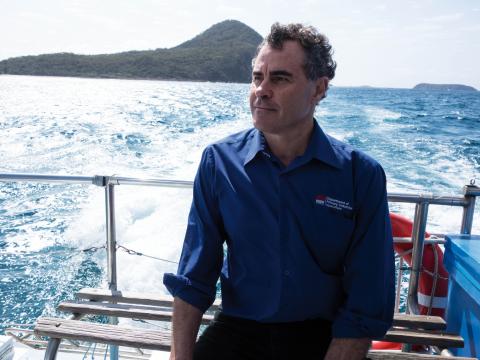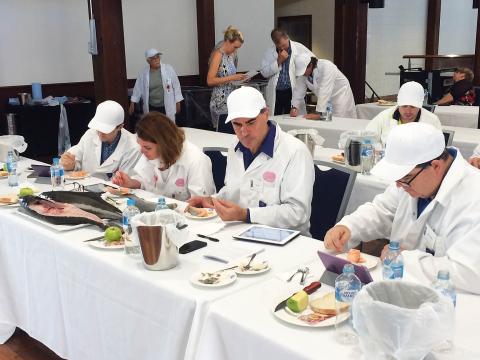Working at the forefront of an emerging sector has provided Ian Lyall with plenty of challenges and a passion for aquaculture
By Catherine Norwood

Ian Lyall says NSW is steering a steady course towards a sustainable aquaculture sector.
Photo: Catherine Norwood
Ian Lyall admits he has been spoiled when it comes to sampling the best that Australian aquaculture has to offer. It is one of the perks of judging the entries in the Sydney Fine Food Show – as he has done with a team of experienced colleagues every year for the past 18 years.
The competition initially started as a sponsorship deal between the NSW Department of Primary Industries (DPI), where he was working, and the Royal Agricultural Society of NSW to support an emerging sector.
Every competition needs judges, and Ian Lyall was well placed to fill a spot on the judging panel. He is a lover of seafood, wild and farmed; a keen recreational fisher who has tasted the best straight from the sea; a marine scientist with experience in prawn farming as well as freshwater fish; and an advocate for sound government policy to support the future of the aquaculture sector.
Twice a year, he gathers with fellow judges to assess the quality of aquaculture products from across the nation. Colleagues over the years have included seafood provedore John Susman, ABC radio presenter Simon Marnie, and national food and media presenter Lyndey Milan. Sydney Rock and Pacific Oysters and prawns are judged in April, while all other categories, including Barramundi, Atlantic Salmon, Rainbow Trout and other fresh and processed fish, are judged in September.
The Fine Food Show has set the benchmark for what is possible – and Ian Lyall says that benchmark is very, very high.
The aquaculture sector in Australia has come a long way since the early 1980s when he studied marine science at James Cook University. Back then, it made up just 20 minutes of class time during his three-year degree.
Aquaculture was not a career path he had considered. But after university and the customary year spent backpacking overseas, he found himself working in NSW’s fledgling aquaculture sector, in a prawn hatchery at Yamba operated by Dalgety’s.
He had worked hard in the past, by virtue of holiday jobs as a builder’s labourer, but found he was still unprepared for the rigours of animal husbandry.
“It made me appreciate how much hard work is involved in growing animals in water,” he says.
The hours were long, time off was limited, and setbacks were frequent in the quest to rear Australian Black Tiger Prawns (Penaeus monodon) to the post-larval phase – the crucial first step in the farming process.
Four years of trials eventually produced a reasonably consistent outcome. At this point Ian Lyall took time out, combining his love of outdoor activities with a job on the ski fields for a season, while he considered his options.
There was clearly an opportunity in the emerging aquaculture sector, and he spent several months in reconnaissance, driving across NSW in search of work and planning a business of his own.
He wound up in central NSW, helping to breed and grow freshwater fish such as Silver Perch (Bidyanus bidyanus), Golden Perch (Macquaria ambigua), and Freshwater Catfish (Tandanus tandanus) on a farm in Condobolin.
“Freshwater fish breeding was very different from prawns, not as hard; procedures were already well developed by fisheries researchers from Narrandera,” Ian Lyell says. “I also learned a lot about marketing there.”
These were the halcyon days of Silver Perch, when they sold for $25 a kilogram live to the emerging Asian restaurant sector in Sydney.

Ian Lyall is a regular judge
for the Sydney Fine Food Awards.
Photo: Royal Agriculture Society of NSW
“We would harvest, pack the truck with fish and water and oxygen, and leave Condobolin at 10 pm, driving into Sydney to unload at our distributor’s place in Sussex Street, Chinatown. He would then take us across the road for a yum cha breakfast.”
Family drew him back to the Sydney region. After some time spent consulting, the lure of a regular paycheck to help provide for his young family saw him take a three-month contract at NSW Fisheries, as it was then, working from an office at the Sydney Fish Market.
It was 1994 and the aquaculture landscape was changing. A new Fisheries Management Act 1994 was expanding beyond traditional oyster cultivation to include other species on land and in marine environments.
When his initial contract ended, Ian Lyall stayed on with NSW Fisheries. By the time Sydney played host to the World Aquaculture Conference in 1999 – an event he helped to organise – excitement was mounting around the potential of aquaculture.
“The possibilities for Australia seemed enormous, given what was already happening overseas,” he says. He recognises that NSW has been slower than other states to advance on these possibilities. As aquaculture program leader of the NSW DPI for the past 15 years, he is intimately familiar with the path of progress.
Positive trends
NSW continued to invest in its long-standing oyster industry, which endured successive critical hits, including food safety scares and disease events, leaving only the most tenacious, adaptable farmers still operating.
Ian Lyall says it has been rewarding to see recent improvements for growers, including an upward trend in production value, which increased 12 per cent in 2017-18, and 20 per cent for the Sydney Rock Oyster industry. (If you are after a benchmark, Tathra Oysters was the leading 2018 Gold Medal winner at the Sydney Fine Food Show.)
The state also invested over many years in freshwater aquaculture, he says. While Silver Perch has not progressed as hoped, Murray Cod (Maccullochella peelii) has recently emerged as the hero of this sector, driven by industry on the back of FRDC and Victorian-sponsored research.
“The growth over the past five years has been extraordinary,” Ian Lyall says. “It’s an iconic Australian species that really captures the imagination in a way that other native freshwater fish species have failed to do. And it is absolutely a world-beater in terms of the quality of the flesh and the taste; it’s unlike any other freshwater fish.”
It is the future of marine aquaculture in the state that has him most excited.
His hope for marine aquaculture builds on the Department of Primary Industry’s successful partnership with Huon Aquaculture to produce Yellowtail Kingfish (Seriola lalandi) in conjunction with the national Kingfish for Profit research program. Huon has managed marine trials at the Marine Aquaculture Research Lease at Port Stephens, where fish growth and production have exceeded expectations.
Ian Lyall says this project has not been without challenges, including communication with stakeholders.
We realised there is a real void in people’s understanding of what aquaculture is and the benefits it brings to the community.”
And Australia does need aquaculture to meet its seafood demand, he says. About 67 per cent of seafood purchased in Australia is from imported sources; in NSW this is 87 per cent.
“We are paying for all those food miles to import fish that we could be growing here,” he says.
Winning community support will be critical, he says, by providing transparency and information on the environmental performance of these operations. He says this has been an important part of his contribution to drafting the three NSW sustainable aquaculture strategies during the past decade – for land-based aquaculture, oysters and, most recently, marine aquaculture.
While the sector’s progress may have been slow to date, Ian Lyall says the state’s strategies provide a solid foundation for the future of aquaculture in NSW – a sector for which he sees great promise on the verge of realisation.





